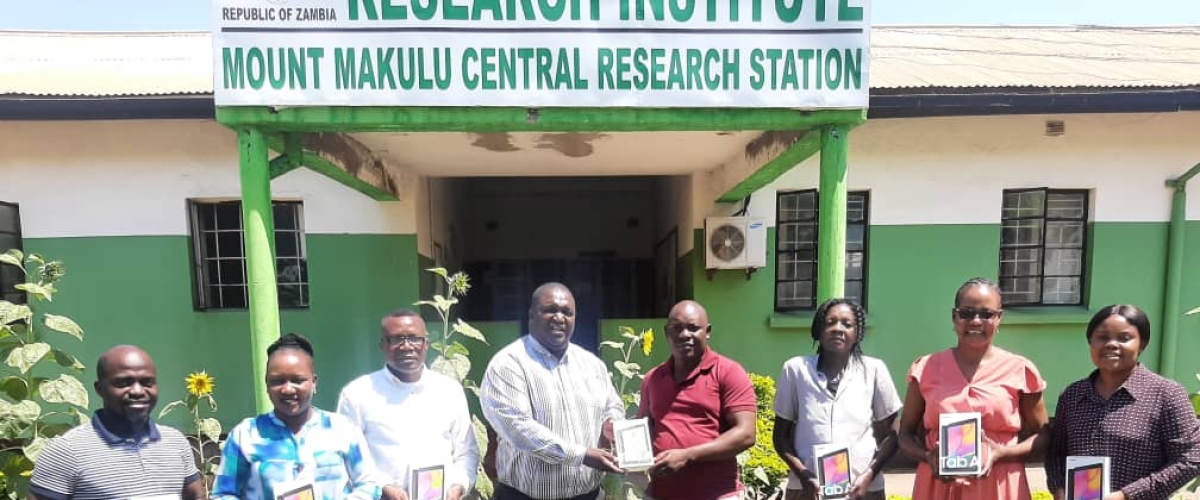
By Dorcas Kabuya-Chaaba
Technology has become the vehicle driving many countries towards attaining their sustainable development goals, and Zambia is not an exception. The use of modern Information Communication Technology (ICT) like mobile phones in disseminating agricultural information to targeted farmers and sharing scientific information among researchers in the era of COVID-19 cannot be overemphasised. Mobile phones and virtual conferencing facilities play an essential role in bridging the information gap between farmers, extension, and researcher staff, leading to increased adoption of technologies. For this reason, the Centre for Coordination of Agricultural Research and Development in Southern Africa (CCARDESA) embarked on an initiative to equip countries' partners with communication tools to fight the face-to-face disruptions that the COVID-19 outbreak has caused.
Zambia Agriculture Research Institute (ZARI), the country's most prominent research entity, receives a Max Hub 3 in 1 state of the Art 65 inches conferencing equipment. The donation comes with 7 Samsung Galaxy A84G LTE blank tablets for extension staff and Information Communication and Knowledge Management (ICKM) focal point persons under CCARDESA. ZARI Deputy Director in charge of Technical Services, Dr Mweshi Mukanga, graced the handover ceremony noting that investment in the ICT sector is critical in developing sustainable food and nutritional security. Dr Mukanga notes that ICT is now a requirement in the agricultural sector, adding that there is a need for concerted efforts by the government and other stakeholders in the region in addressing the needs of the farmers. He advised the beneficiaries of the tablets to take advantage of developments in ICT to reduce problems associated with farming in the new era of the internet to improve agriculture. “We have a mandate as a ministry to ensure that farmers are abreast with the latest agricultural information, and as extension staff, you are the first call when farmers are faced with any challenge in their day-to-day farming activities. You need to keep it at the back of your mind that you are there to serve farmers,” he said.
Dr Mukanga noted that agriculture is dynamic due to issues associated with climate change, adding that extension staff needs to be updated with the latest information because a lot of agricultural technologies are being developed locally and in the region that the extension staff could leverage. He also urged the beneficiaries to transfer the CCARDESA Learning Mobile App information to the farmers and community members of the last mile beneficiaries. He urged them to use innovative ways to transmit the knowledge to have a long-lasting impact and effect on farming ways. He further stated that information is power, adding that even amidst the challenge of the COVID-19 pandemic, information has to be shared with the farming community through messaging and the use of applications such as the CCAREDSA Learning Mobile Application.
And CCAREDSA ICKM focal point person, Jones Malama, encouraged the extension staff to use the tablets for the intended purposes to realise the value for money. “We have the opportunity through CCARDESA to own tablets; let's ensure that we use them for the intended purpose and regard it as our bible in our delivery of extension messages to the farmers because it has all the relevant information to advance the agricultural and knowledge management agenda,” said Mr Malama.
The donation will go a long way in enhancing digital communication between extensionists and farmers by providing feedback on agricultural challenges.
The author is an Agriculture Information Officer at the National Agricultural Information Services. She is also CCARDESA Information, Communication and Knowledge Management (ICKM) focal point person for Zambia.






